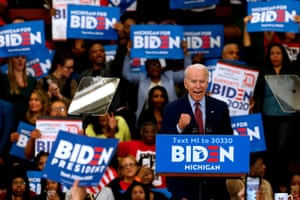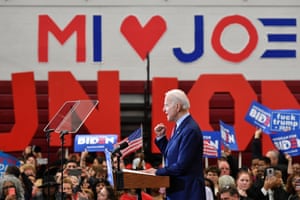‘I know what’s at stake’: can Biden win over skeptical Sanders supporters?
Democratic candidate is aggressively courting critical constituency of younger and left-wing Democrats who have so far rejected his presidential bid

Photograph: Jeff Kowalsky/AFP via Getty Images
Joe Biden was not their first choice. In some cases, he wasn’t even their second or third. Now, as the all-but-certain nominee, Biden is aggressively courting a critical constituency of younger and leftwing Democrats who have so far rejected his presidential bid.
Last month, Biden stitched together a wide range of support from African Americans, suburbanites and working-class white voters to rack up wins across the country and amass an almost indomitable lead over his rival, democratic socialist senator Bernie Sanders. Yet missing from that coalition is the young and more liberal voters who overwhelmingly prefer Sanders’ call for political revolution to Biden’s promise of a return to “normalcy”.
Determined not to repeat the mistakes of 2016, when the party struggled to unify after a divisive primary battle that stretched into the summer convention, Biden is now amplifying his appeals to the party’s left.
According to campaign officials, his team has for weeks quietly engaged top progressive organizations and movement leaders representing a range of Democratic causes from climate change to racial justice. The effort, spearheaded by senior Biden advisers, includes outreach to legacy organizations such as Planned Parenthood as well as newer, youth-led groups like the Sunrise Movement.
Biden has also made overt gestures. He recently adopted a plan by his former rival, Elizabeth Warren, to overhaul the consumer bankruptcy system and embraced elements of Sanders’ tuition-free college proposal.
“Let me say, especially to the young voters who have been inspired by senator Sanders: I hear you,” Biden said after sweeping three major primary contests last month. “I know what is at stake. And I know what we have to do.”
There is a delicacy around the engagement, especially with Sanders still claiming his campaign has a “narrow path” to the nomination despite calls to bow out of the race. The left came tantalizing close to nominating a presidential candidate they hold up as a progressive champion only to watch in dismay as Biden, who is unquestionably more moderate, all-but vanquished those hopes, and with startling speed.
There is a mutual understanding that the party must unify to defeat Donald Trump in November. But progressives also believe they have built sufficient leverage to press for sweeping policy concessions from Biden, particularly given the potentially worrisome lack of enthusiasm for his candidacy.

“Joe Biden, as the moderate frontrunner, has to convince progressives to support him,” said Julian Brave NoiseCat, who directs Green New Deal strategy at the progressive think tank Data for Progress. “He needs more enthusiasm behind his campaign, and it’s been a bruising campaign cycle.”
In interviews with progressive organizers, climate change has emerged as a key area where activists believe they can “push” the former vice-president, in part because combatting global warming draws broad support from every corner of the party. Several polls this cycle have found that Democratic voters rank climate change among their top three issues, often second only to healthcare.
Data for Progress, along with climate staff from Washington governor Jay Inslee’s former presidential campaign, are among those urging the Biden team to prioritize climate change.
In a recent six-page memo, the group laid out five policy areas where he could issue new proposals or emphasize existing ones. They are: stronger clean energy standards with clearer targets, investments in green infrastructure, a dedicated 40% of climate money going to disadvantaged communities, restrictions on Wall Street financing of fossil fuels and a commitment to high-quality union jobs. NoiseCat said the Biden campaign is engaging the authors at a high level.
Some progressives believe Biden, who spent decades in the Senate before serving as vice president, would have a better shot at moving climate legislation through Congress because of his longstanding relationships and pragmatic approach. Biden also has strong ties to labor unions that are skeptical of ambitious proposals to tackle climate change.
Already Biden has suggested Democrats should push for “Green Deal” spending in the next aid package responding to the economic downturn spurred by the coronavirus pandemic. Though he is unlikely to endorse policies to significantly curb drilling for oil and natural gas – like a fracking ban – which could alienate supporters in swing states like Pennsylvania.
“There’s a lot more that can be done to have the full-scale mobilization of the federal government that is needed to defeat climate change,” said Jamal Raad, former aide to Inslee’s 2020 presidential campaign. “That’s the task at hand here for the next president.”

Progressive activists say their overriding priority in 2020 is to defeat Trump. But they warn that antipathy for the president is not enough to win in November. And how Biden engages the left and what concessions he is willing to make could determine the nature of their electoral efforts on his behalf.
“Will enough people be willing to volunteer for the nominee? Or send text messages for the nominee? Or overcome the barriers of voter suppression that we know are coming to vote for the nominee,” said Jennifer Epps-Addison, the network director at the Center for Popular Democracy, which endorsed Sanders. “That’s what’s at stake.”
Epps-Addison echoed many Democratic activists in urging Biden to put a progressive standard-bearer on the ticket with him. Biden has said he would choose a woman as his running mate, an overture to Democrats deeply disappointed that two white men in their 70s emerged from a historically diverse and female presidential field.
Both Democratic contenders have vowed to actively support whoever becomes the party’s nominee.
Yet Biden, confined to his home in Delaware amid the coronavirus outbreak, has so far struggled to re-create the grassroots excitement that has powered Sanders’ presidential bid, with packed rallies and an endless stream of small-dollar donations. Meanwhile, Sanders has continued to criticize his opponent’s record.
Asked during the last Democratic debate how he might appeal to Sanders’ supporters if he became the nominee, Biden quipped: “He’s making it hard for me right now.”
Though Sanders’ chances of clinching the nomination have faded, the progressive proposals he championed on healthcare, climate change and student debt remain widely popular among Democratic voters – a point the senator has made explicitly as he defends his continued presence in the primary race. His ideas, the senator has asserted, are winning the “ideological” and “generational” debate” – even if he is not.
Biden may be the eventual nominee, said Adam Green, co-founder of the Progressive Change Campaign Committee, which endorsed Warren, but “tens of millions of people who supported Warren and Sanders nonetheless wanted a president who advocated for bold, progressive policy ideas.”

Alexis Confer, executive director of March For Our Lives, which was founded by survivors of the Parkland high school shooting in Florida, said the best way for Biden to reach young voters is to address their priorities with a shared sense of urgency.
“We see our daily work as fighting the largest epidemic in our country,” Confer said, referring to the scourge of gun violence that claims more than 36,000 American lives each year. But they also view their activism as part of a wider movement for social, racial and economic justice, she added, emphasizing that “people don’t live single-issue lives.”
In discussions with Biden’s team, March for Our Lives is advocating for a 10-day waiting period on all firearm purchases, a federal gun licensing program and the creation of an administration role dedicated to combating gun violence.
Pro-choice organizations are also eager to see Biden elevate his support for reproductive rights, especially in light of efforts in conservative states to restrict abortions during the pandemic.
Early in the primary season, Biden abandoned his support for the Hyde Amendment, which bans the use of federal funds for abortion with some exceptions. But he has a shifting voting record on the issue and some advocates have called on him to release a standalone plan outlining his commitment to defending reproductive rights.
“Voters need to know that addressing this crisis is top of mind for our next president and that our nominee understands that reproductive freedom is fundamental to achieving meaningful equity in society,” NARAL President Ilyse Hogue said in a statement.
Immigration is a particularly thorny issue for Biden. Throughout the primary season, he has faced fierce criticism from immigration activists over the Obama administration’s deportation policy, which resulted in the removal of roughly three million people. At campaign events and even during Democratic debates, Biden was met with protests and interruptions from activists shouting: “Not one more deportation.”
Cristina Jiménez, executive director of United We Dream Action, a youth-led immigrant rights network, said Biden has work to do to “bridge the trust gap” with Latino voters, a powerful Democratic constituency that tends to be younger. In the primary, many of these voters flocked to Sanders, who proposed a sweeping overhaul of the nation’s immigration system.
Her group, which jointly endorsed Sanders and Warren, expects to meet with Biden’s team in the coming weeks. In those discussions, they intend to press him to commit to using executive authority to expand programs like Daca, which shields certain immigrants from deportation and to repeal a 1996 law that increased penalties for crossing the border illegally.
Biden has acknowledged the “incredible pain” caused by deportation and recently pledged to halt nearly all removals in the first 100 days of his administration, a move activists believes is a testament to their advocacy.
Still, many progressives remain skeptical.
“Right now it still feels like more of the same,” said Erika Andiola, chief advocacy officer at the immigration services organization RAICES and a former staffer on Sanders’ 2016 campaign. “That’s why we have to keep pushing him.”
In a virtual fundraiser on Friday, Biden was optimistic that he could find common ground with the Democrats most leery of his campaign in time to bring the party together in November.
“There’s a lot of good ideas they have – I disagree with many of them,” Biden said. But he continued: “There’s lot of significant change that can take place – both structurally and practically – that can bring everybody along.”




